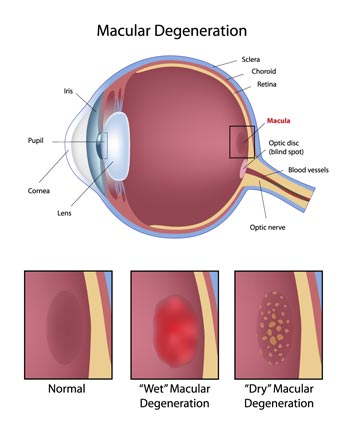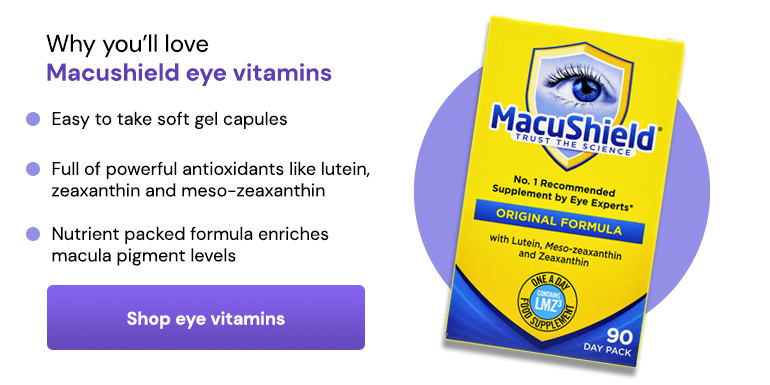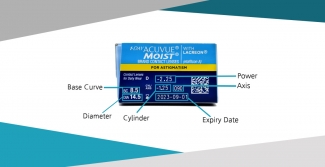What is Macular Degeneration?
Macular degeneration is the leading cause of vision loss in the UK. According to the Macular Society, it affects more than 1.5 million people in the UK, and usually occurs as a result of getting older.
What is macular degeneration?

Age-related macular degeneration (AMD) is an eye condition which leads to the loss of central vision over time. The macular is a part of your eye that contains cone cells that register light and is responsible for your central vision. Macular degeneration occurs when these cone cells begin to stop working. This can lead to blurry vision, muted colours, and difficulty recognising faces.
Who is likely to suffer from macular degeneration?
Typically, women are more likely to suffer from AMD, although it’s not known why. It is also more prevalent among older people, with an estimated 10% of over 65s suffering from some form of AMD.
Symptoms of macular degeneration
Depending on the type of macular degeneration, you may experience symptoms either gradually, or over the course of a few days. You may experience loss of central vision, causing difficulties with seeing objects directly in front of you, whilst still maintaining good peripheral vision. This can eventually lead to a complete blank spot in your central vision.
Dry Age-Related Macular Degeneration
Dry age-related macular degeneration (DAMD) occurs as a result of a build-up of fatty proteins in the eyes, called drusen. This usually happens due to age, therefore DAMD is more common in older people. Although vision gradually deteriorates over several years, DAMD develops into wet age-related macular degeneration for one in 10 people.
Wet Age-Related Macular Degeneration
Wet age-related macular degeneration (WAMD) is more serious than DAMD and can cause vision loss within just a few days. This form of macular degeneration happens due to the eye growing new blood cells to compensate for the macular not working correctly. The cells can cause bleeding and scarring, severely damaging vision.

How to reduce your risk of Age-Related Macular Degeneration
1) Quit Smoking:
Smoking is one of the leading contributors to vision loss from AMD because it speeds up the progression. Also, smoking increases the level of oxidants found in your bloodstream and eyes which makes treatment for AMD less effective.
2) Cardiovascular disease & keeping a healthy Blood Pressure:
High blood pressure (hypertension) encourages macular degeneration because it restricts the blood to the vascular layer of the eye (the choroid). This causes a lack of oxygen transmitted to the eye, increasing the risk of Wet Age-Related Macular Degeneration and central vision loss. The loss of oxygen accelerates the progression of AMD. Ensure that medications for cardiovascular issues & high blood pressure are taken correctly following your doctor's instructions.
3) Increase Antioxidants in Your Diet:
When suffering from Age-Related Macular Degeneration, the retina is sensitive to oxidative stress (a process where free radicals destabilise healthy molecules as the electrons are replaced with oxygen.) People with AMD experience oxidative stress throughout their entire body. Over time the stress can weaken the body’s capability to clear damaged cells from the eye.
Antioxidants prevent or reduce the damage caused by free radicals by supplying electrons to free radicals, leaving the normal cells untouched. A healthy diet full of fruits & vegetables will hold abundant antioxidant vitamins that reduce the risk of developing macular degeneration. Research from the National Eye Institute suggested that a supplement with a specific blend of antioxidants and minerals can slow or stop the progression of early or intermediate AMD when taken daily.

4) Reduce intake of Carbohydrates: Eating fewer simple carbohydrates can help slow or even stop the progression of AMD. Consuming more complex carbohydrates is one of the simplest ways to reduce the risk of AMD.
Good carbohydrates which help your diet:
- Whole grains
- Fibre-rich foods such as fruits and vegetables
- Beans and legumes
Simple carbohydrates to avoid:
- Processed Sugar
- Sodas and sweetened drinks
- Fruit Juice
- Pastries
- White bread
- Ice cream
- Sweets
- Cakes, cookies & cereals
5) Include Omega -3 fatty acids in the diet:
Healthy fatty acids Omega-3 help reduce the risk of developing macular degeneration. These are found in fish such as salmon, tuna, mackerel, herring, cod & sardines. Nuts such as walnuts & seeds such as flax, hemp & chia seeds are also rich in Omega-3.
6) Maintain a healthy weight & exercise regularly:
Reducing the number of calories eaten is ideal for weight loss as well as increasing the amount of exercise each day.
7) Wear protective eyewear - Sunglasses:
Ongoing exposure to UV radiation from the sun can cause retinal damage, accelerate the progression of AMD and contribute to the formation of cataracts. Wearing sunglasses will help reduce this risk. To ensure maximum protection from UV rays, the sunglasses must have a UV 400 rating. Sunglasses with a UV 400 rating reduce UV exposure by around 99%.
8) Regular Eye Checks:
As you get older regular eye tests should be part of your routine health care. Having regular eye exams can help spot any early signs of macular degeneration and can keep on top of any deterioration in your vision if you do suffer from AMD
What about macular degeneration in younger people?
If you are under the age of 50 and are experiencing macular degeneration, it is likely to be caused by a genetic disorder. Some forms of macular degeneration found in younger people include Best’s Disease, Stargardt Disease and Myopic macular degeneration.
How to cope with AMD
Losing your sight can be very worrying. You may wish to seek help, advice, or reassurance from charities such as the Royal National Institute for Blind People (RNIB) to help you through this difficult time. While you may feel alone if you suffer from this condition, it is not uncommon and there are many options available to you. By registering as partially sighted, you may be able to receive money from the government to compensate for any financial loss. Social services in your area should be able to guide you on mobility issues and there are many ways to make the most of your remaining sight.
At Lenstore we offer main brand lenses at prices heavily discounted compared to the high street. Have a look through our full range of contact lenses to find your perfect fit.









